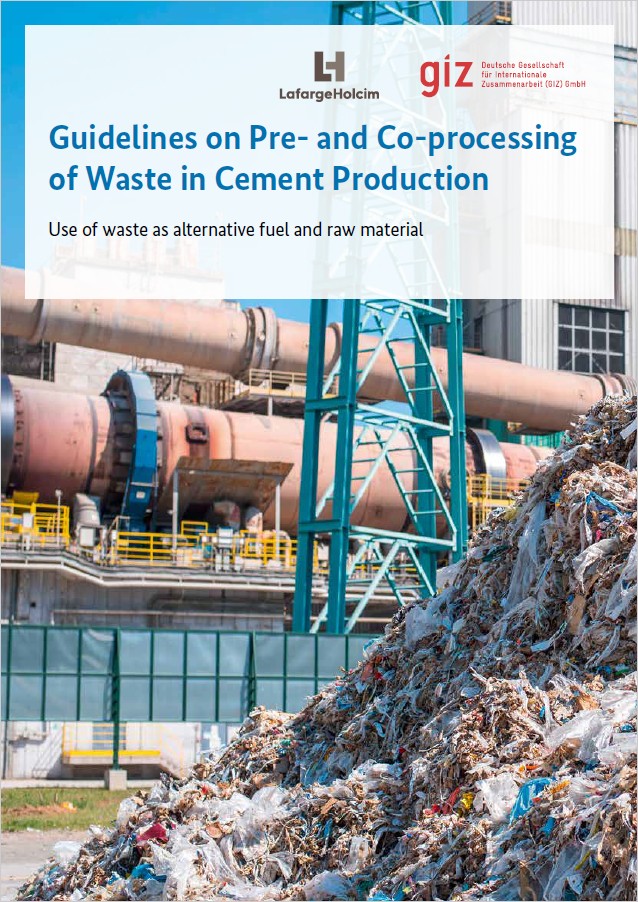Geocycle activities fully embrace the waste regulatory framework in each country and provide a sustainable solution that supports local waste policy objectives, through recycling and energy recovery.
Our solution of co-processing has been evaluated globally for more than 40 years. It is an approved technology by Basel Convention for disposal of all kinds of Hazardous and Other Wastes. It is recommended for the destruction of POPs and ODS under Stockholm Convention. Trials conducted in cement kilns spread across the world have confirmed that wastes do not impact the cement kiln emissions or the product in any adverse manner.
Co-processing is fully recognized by many countries such as India, Mexico, Brazil, US, Europe and many others. In its recent communication, The European Commission advised Member States to take a long-term perspective and consider co-processing as an important lever for circular economy.
Guidelines on pre- and co-processing of waste in cement production
GIZ, FHNW, LH and Geocycle have issued the guidelines on Co-processing Waste Materials in Cement Production to support further development of environmentally sound and safe pre- and co-processing in developing countries.
Objective of the new guidelines:
- Contribute to improve poor waste management practices, in particular in developing low and middle income countries
- Promote Pre- and Co-processing as a competitive and sustainable waste management solution
- Facilitate close collaboration between the public and private sectors on the topic
- Set ambitious global standards for companies active in Pre- and Co-Processing
- Share good practices and propose means for capacity building to ensure sound application of the technology
- Provide links to organizations, institutions and companies active in the field of pre- and co-processing
Principles and Requirements
- Pre- and co-processing shall respect the waste hierarchy and therefore don’t hamper waste reduction, reuse and recycling.
- Pre- and co-processing shall be regarded as an integrated part of modern waste management, as it provides an environmentally sound mineral recycling and energy recovery solution.
- Pre- and co-processing can be regarded as a contribution to the circular economy by reducing the use of fossil fuels and primary raw materials as well as ensuring clean material cycles through elimination of harmful substances.
- Compliance with all relevant laws and regulations has to be assured. Pre- and co-processing shall be in line with relevant international agreements (e.g. Basel and Stockholm Conventions).
- Effective monitoring by an independent environmental regulator, that has sufficient institutional capacity shall be ensured.
- Country-specific requirements and needs shall be reflected in regulations and procedures.
- If a local legal framework for pre- and co-processing is not existent and/or consistent, international best practices shall be applied and build-up of the required capacity as well as the set-up of institutional arrangements ensured.
- Additional emissions and other negative effects on the environment from pre- and co-processing shall be prevented or kept at minimum.
- Emissions to air and water from co-processing shall not be higher than from cement production without co-processing.
- The cement products (concrete, mortar) shall not be used as a sink for potentially toxic elements (e.g. heavy metals).
- Only appropriate waste streams shall be selected. These shall be pre-processed to ensure quality control, proper handling and stable kiln operation during co-processing.
- Companies engaged in pre- and co-processing must be qualified. They shall ensure continuous control and monitoring of inputs and relevant parameters of their production processes.
- The quality of the cement products (concrete, mortar) remain unchanged.
- Companies active in pre- and co-processing shall establish appropriate risk controls to provide healthy and safe working conditions for employees and contractors.
- Companies shall have good safety compliance records as well as personnel, processes, and systems committed to protecting health and safety in place.
- Companies active in pre- and co-processing shall engage regularly and communicate transparently with the public, relevant authorities and other stakeholders.
- Country-specific and local needs as well as different cultural contexts shall be taken into account when implementing pre- and co-processing.
- Companies engaged in pre- and co-processing shall consult and collaborate with actors in the existing local waste management value chain, including informal waste workers.
- Pre- and Co-processing projects shall be based on a financially sustainable business model, which brings value to all involved stakeholders and local communities.
- Financing mechanisms shall be in place to ensure that interventions have financing covered in the medium to long term.
- Monitoring and auditing systems need to be in place to enable successful implementation.
- Capacity building and training at all levels is essential.
Download Guidelines

- Summary – LH GIZ Guidelines on Pre- and Co-processing of Waste in Cement Production
- Assessment Matrix – LH GIZ Guidelines on Pre- and Co-processing of Waste in Cement Production
- LH GIZ Guidelines on Pre & Co-processing of Waste in Cement Production
- LH GIZ Guidelines on Pre- and Co-processing of Waste in Cement Production (Arab ver.)
- LH GIZ Guidelines on Pre- and Co-processing of Waste in Cement Production (Chinese ver.)
- LH GIZ Guidelines on Pre- and Co-processing of Waste in Cement Production (Spanish ver.)
- LH GIZ Guidelines on Pre- and Co-processing of Waste in Cement Production (French ver.)






